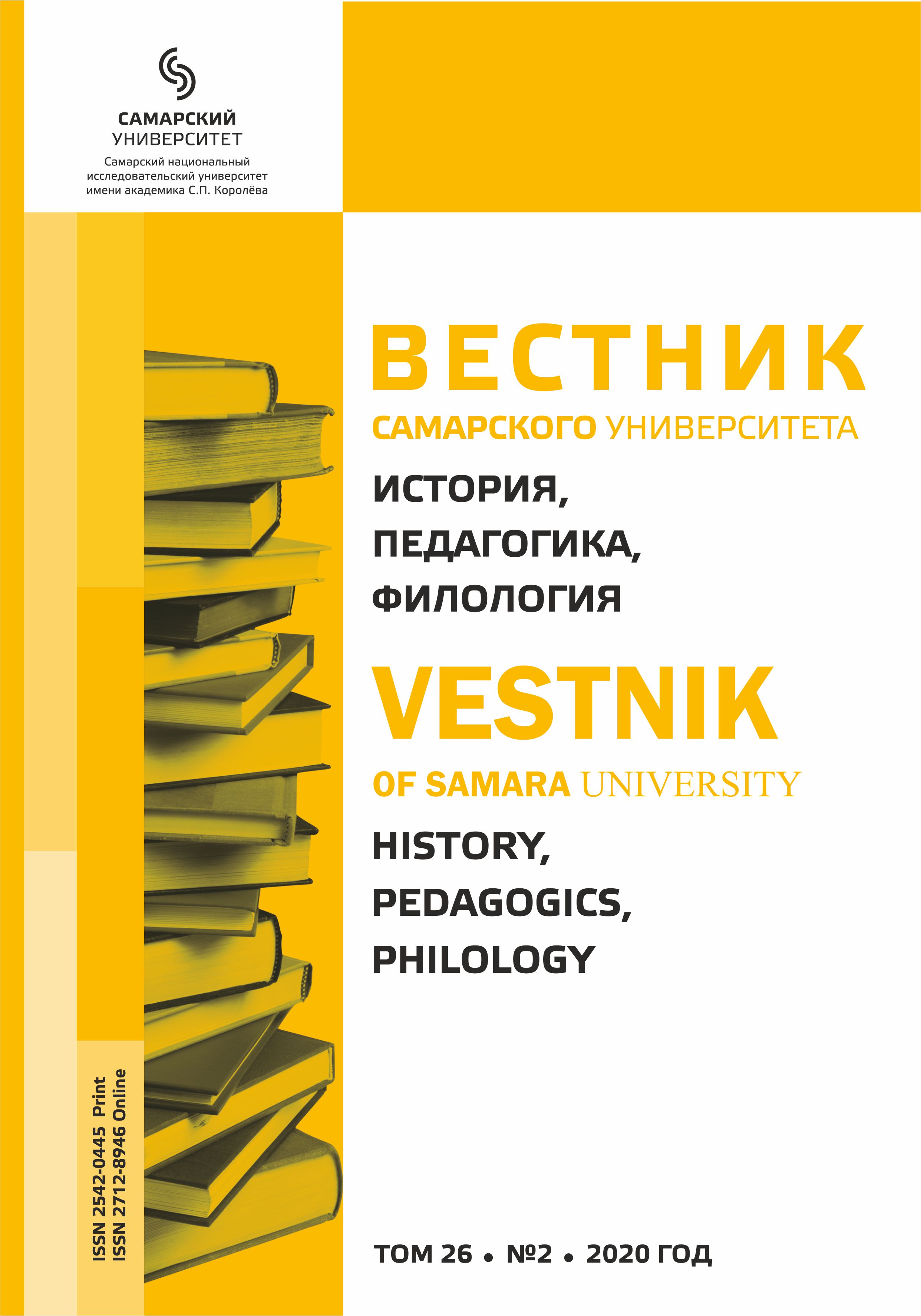System relations between word-building types of verbs with the meaning of negative consequences of action
- Authors: Godizova Z.I.1, Van Q.1
-
Affiliations:
- North Ossetian State University after K.L. Khetagurov,
- Issue: Vol 26, No 2 (2020)
- Pages: 137-143
- Section: Articles
- URL: https://journals.ssau.ru/hpp/article/view/7895
- DOI: https://doi.org/10.18287/2542-0445-2020-26-2-137-143
- ID: 7895
Cite item
Full Text
Abstract
The article is devoted to the description of the system relations between word-building types corresponding to the aktionsart with the meaning of negative consequences of action. This is a group of prefixal and confixal verbs where the negative effects of an action are caused by excessive intensity or duration of action. The study of aktionsart with the meaning of negative consequences of action is of great interest first of all for they express the complex of aspectual meanings and it is essential to identify what creates such a complex semantics. Secondly, the semantics of negative consequences itself should be specified. Multiplicity of the mentioned aktionsarts confirms that semantics of negative consequences of action is relevant for the Russian language and for the whole Russian linguistic worldview. It is noteworthy to determine possible system relations arising between the verbs of the mentioned aktionsarts. The purpose of the article is to identify possible system relations arising between verbs of the specified manners of action. While the study methods of observation, description, functional and semantic analysis, component analysis were used. As a material for the study, examples from works by Russian writers selected from the Russian National Corpus (S.A. Alexievich. V.P. Astafyev, V.V. Bykov. F.M. Dostoyevsky, A.I. Kuprin, O.A. Slavnikova, V.I. Shukshin) were used. The conducted research elicited possible relations of word-building synonymy between different word-building types when identical word-building meanings are expressed by derivatives with different affixes and with a common derivative base. This type of word-formative synonymy is revealed in the framework of total aktionsart (with prefixes iz- and vy-) and excessive-multiple aktionsart (with confixes iz-...-sya and vy-...-sya). Amid the various word-formative types with the same prefix the relationships of enantiosemy (verbs with the prefixes ob-, za-, na-) were revealed as well. Opposite meanings of increase and diminution of action intensity arise in case the prefix is combined with different groups of motivating verbs. The reasons of this phenomenon are established.
About the authors
Z. I. Godizova
North Ossetian State University after K.L. Khetagurov,
Author for correspondence.
Email: morenov@ssau.ru
ORCID iD: 0000-0002-3277-3708
Doctor of Philological Sciences, associate professor, Department of Russian Language
Quian Van
North Ossetian State University after K.L. Khetagurov,
Email: morenov@ssau.ru
ORCID iD: 0000-0002-8275-1793
post-graduate student of the Department
of Russian Language, Faculty of Russian Philology
References
- Volohina, Popova 1999 – Volohina G.A. and Popova Z.D. (1999) Syntactic concepts of the Russian simple sentence. Voronezh: Izd-vo Voronezh. gos. un-ta, 1999, 196 p. Available at: https://www.elibrary.ru/item.asp?id=28741734. (In Russ.)
- Godizova, Van 2018 – Godizova Z.I. and Wang Tsyan (2018) Confixed verbs with negative semantics of action consequences in modern Russian. Humanities and law studies, issue 4, pp. 215–223. Available at: https://www.elibrary.ru/item.asp?id=37056329. (In Russ.)
- Godizova, Van 2019 – Godizova Z.I. and Van Quian (2019) Systemic functional peculiarities of the verbs of the final negative way of acting in the modern Russian language. Vestnik Samarskogo universiteta. Istoriia, pedagogika, filologiia = Vestnik of Samara University. History, pedagogics, philology, no. 3, pp. 95–102. doi: 10.18287/2542-0445-2019-25-3-95-102. (In Russ.)
- Zaliznyak 1995 – Zaliznyak Anna A. (1995) Experience in modeling the semantics of prefixed verbs in the Russian language. Russian linguistics, vol. 19, pp. 143–185. doi: 10.1007/BF01080720. (In Russ.)
- Krongauz 1993 – Krongauz M.A. (1993) Semantics of the Russian verb and its word-forming scope. Russian Linguistics, no. 17, pp. 15–36. (In Russ.)
- Kubryakova 1981 – Kubryakova E.S. (1981) Types of linguistic meanings. Semantics of derived word. Moscow: Nauka, 200 p. Available at: https://b-ok.cc/book/3713965/da0ef1. (In Russ.)
- Kubryakova 1999 – Kubryakova E.S. (1999) Cognitive aspects of word-formation and related rules of inference (semantic conclusion). In: Vergleichende Studien zu den Slaviscen Sprachen und Literaturen. Frankfurt am Mein, vol. 3, pp. 23–36. (In Russ.)
- Kubryakova 2001 – Kubryakova E.S. (2001) Cognitive linguistics and problem of composite semantics in the word-formation sphere. Izvestiya RAN. Seriya literatury i yazyka = The Bulletin of the Russian Academy of Sciences: Studies in Literature and Language, no. 1, p. 13. (In Russ.)
- Kubryakova 2009 – Kubryakova E.S. (2009) On cognitive base of word-formation. In: Topical issues of modern linguistics: materials of the International scientific conference, pp. 15–19. Available at: https://www.elibrary.ru/item.asp?id=21784399. (In Russ.)
- Markov, Nikolaev 1976 – Markov V.M. and Nikolaev G.A. (1976) Some issues on the theory of Russian word formation. In: Nominative word formation of the Russian language. Kazan: Izd-vo Kazan. un-ta, pp. 3–14. Available at: https://www.elibrary.ru/item.asp?id=25748860. (In Russ.)
- Nikolaev 2009 – Nikolaev G.A. (2009) Russian historical word formation: theoretical issues]. Moscow: Knizhnyi dom «Librokom», 177 p. Available at: https://www.elibrary.ru/item.asp?id=25712551. (In Russ.)
- Petruhina 2018 – Petrukhina E.V. (2018) Key issues in modern Slavic word formation (in the light of the works of E.S. Kubryakova. Cognitive Studies of Language, no. 32, pp. 179–192. Available at: https://www.elibrary.ru/item.asp?id=35000444. (In Russ.)
- Russian Grammar 2005 – Russian grammar: in 2 vols. Moscow: In-t russkogo yazyka im. V.V. Vinogradova, 2005. Available at: http://ussrbooks.ru/russkaja-grammatika-v-2h-tomah-n-ju-shvedova-1980. (In Russ.)
- Theory of Functional Grammar 2014 – Bondarko A.V. (Ed.) (2014) Theory of Functional Grammar. Introduction. Aspects. Temporary Localization. Taxis. Moscow: Librokom, 358 p. Available at: https://superlinguist.ru/grammatika-skachat-knigi-besplatno/bondarko-a-v-teoriia-funktcionalnoi-grammatiki-vvedenie-aspektualnost-vremennaia-lokalizovannost-taksis.html. (In Russ.)
- Uluhanov 2012 – Uluhanov I.S. (2012) Word formation semantics in the Russian language and the ways of its description. Moscow: Izdatel'stvo LKI, 264 p. Available at: https://cassiopeiabook.info/books/slovoobrazovatelnaya-semantika-v-russkom-yazyike-i-printsipyi-ee-opisaniya. (In Russ.)
- Shelyakin 1979 – Shelyakin M.A. (1979) Terminal continuous and terminal intensive ways of action in the modern Russian language. Uchenye zapiski Tartuskogo gos. universiteta, no. 4, issue 482, pp. 64–74. Available at: https://dspace.ut.ee/bitstream/handle/10062/27917/482_kategorija_vida.pdf. (In Russ.)
Supplementary files













